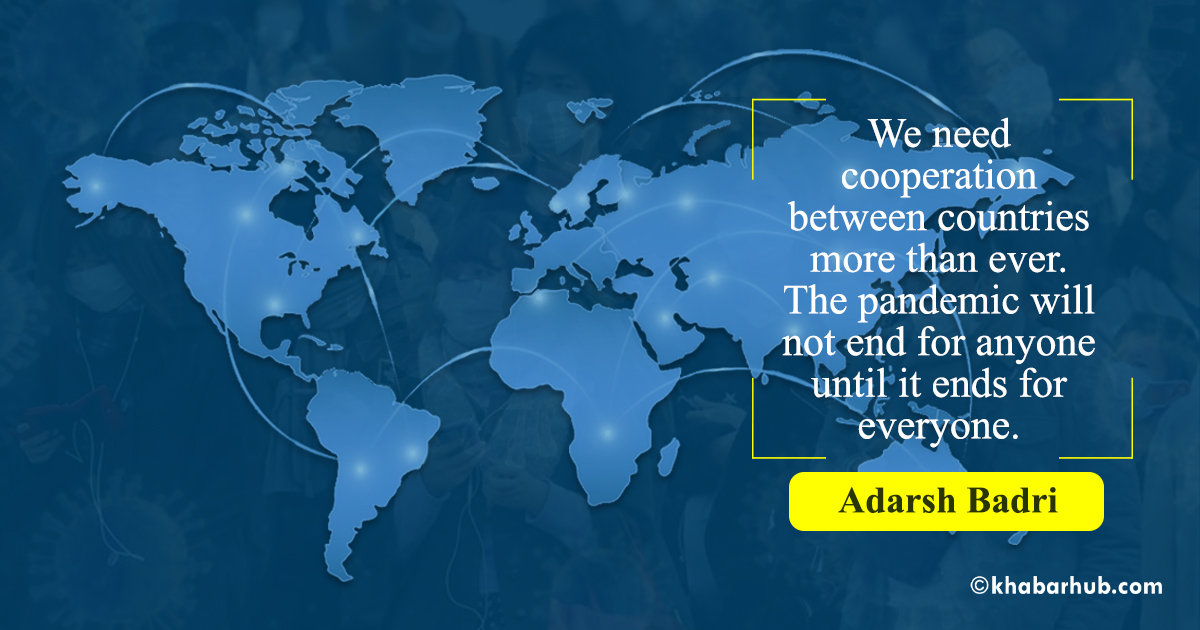The COVID-19 crisis has created a new normal – empty streets, closed cafes and restaurants, sealed borders, restricted travels, and virtualized human interactions – a world paralyzed at its own pace.
Coronavirus has engulfed everyone’s lives with the fear of the unknown, or rather, of the unforeseeable. People, in billions, have been forced to stay at home. Young and the old alike, complaining of fever and dry cough, have filled hospitals in thousands.
Citizens, at least the privileged, lined up in supermarkets to stock up groceries and toilet papers. Meanwhile, the rest complained, “We will die – either from the virus or from hunger”.
The Chinese Government denied all the initial evidence and suppressed those who had warned of it, most tragically the Wuhan physician Li Wenliang. The global response to the crisis has been too little, too late, and too laggard.
In a globalized society, the pandemic has produced a new form of self-organization that isolates the self from others to sustain itself. The pandemic has made uncertainty a new normal.
The novel Coronavirus outbreak began in Wuhan, China, in December 2019. The virus has since spread like a wildfire across the globe.
More than two million people throughout the world have contracted the virus and tens of thousands of them have died.
Initially, China had covered up the extent of the spread of the COVID-19 outbreak for several weeks in December.
The Chinese Government denied all the initial evidence and suppressed those who had warned of it, most tragically the Wuhan physician Li Wenliang. The global response to the crisis has been too little, too late, and too laggard.
The nation-states have been seeking to look inwards. As a result, the COVID-19 crisis seems to be nowhere in sight of control.
Pandemics provide the nation-states with an opportunity to seek control over the human population. They enable the rise of a big-state that takes tough measures towards its survival.
Several leaders across the globe have been using the pandemic as an opportunity to suppress their population, thereby resulting in an Orwellian State – Big Brother is Watching You.
Three such features of a pandemic-state are surveillance, authoritarianism, and xenophobia. Countries, both democratic and non-democratic, have been using technology to track the movement of their citizens. Surveillance has become a new tool to control the spread of the pandemic.
Nation-states have enforced their citizens to follow the norms of social-distancing, while also punishing those not adhering to them.
Surveillance technologies have been used to track where people are, where they have been, and what their recovery status is.
This data is further used to determine the extent of the spread of disease and then track those who have been in contact with those infected by the virus.
Israel has authorized the internal security agency to tap the secret trove of cellular data of its citizens. South Korea and other East Asian countries have had their initial success in digital contact-tracing using mobile applications.
Many countries across the globe have been following suit. States have been exercising the power to monitor people using technology.
Several leaders across the globe have been using the pandemic as an opportunity to suppress their population, thereby resulting in an Orwellian State – Big Brother is Watching You.
In response to the crisis, the world autocrats have been employing a mixture of propaganda, suppression of political rivals, and expansion of political powers.
As an old maxim goes, “Never let a good famine go to waste”, many world leaders have been successful in their power grabs.
Pandemic has enabled the leaders to legitimize the use of executive powers, detain people, and infringe on the freedoms of expression. Hungary has passed a new law that grants Prime Minister Victor Orban the power to suspend the country’s existing laws.
An indefinite State of Emergency has been declared in Hungary, curtailing the freedom of expression and penalizing those breaking quarantine orders.
Philippines legislature has granted President Rodrigo Duterte with emergency powers. And the President has imposed shoot-to-kill orders of those not following the quarantine norms.
In Egypt, chemical warfare troops, clad in the protective suit have been deployed to disinfect the suburbs. Pandemic has allowed the Governments to ban public assemblies, quarantine, close borders, limit trade, impose restrictions on movement, and censor media.
History also suggests that after a crisis, the state does not give up on all the ground it had secured. Thus, it is imperative to speculate about the kind of state we would live in after the crisis.
There has also been a rise in the process of ‘othering’ with the outbreak of the COVID-19 pandemic.
Instead of taking the opportunity to embrace and support one another, the nation-states have become the spouts of xenophobia.
Even as the COVID-19 spread across the globe, reports of racism towards East Asians have been on the rise in Western democracies.
The President of the United States, Donald Trump, has repeatedly referred to the Coronavirus as ‘Chinese Virus’. Incidents of racially motivated crimes have risen throughout the United States since the outbreak of the virus.
Xenophobia has become a petty tool for governments and their citizens to color responses concerning the pandemic. Media also plays an important role in the creation of ‘the other’, as a contrast to the self.
Xenophobia systematically enables the social stigma towards others in society. The moment a pandemic is regionalized and stigmatized, humanity will suffer a sad demise.
Scholars across the globe have given their verdict on a post-pandemic world, with many affirming that the “world will be less open, prosperous, and free”.
Some scholars believe that China would rise as a new global power; some others have written an obituary to hyper-globalization.
Climate change, for good, will gain limelight in a post-pandemic world. It is interesting to see how the crisis in itself pans out over the period to provide an affirmative answer.
A pandemic-state will always be mired by the rise of authoritarianism, surveillance, and xenophobia. However, such a state will not be suitable for a post-crisis era.
We need to keep in check the power of Governments in a post-pandemic society. United Nations, as an agency, has failed to provide a collective global response. Its decline seems evident, more than ever. It should not mean a demise of ‘global governance’.
We need institutions with a robust and structured form of global governance mechanisms. A world government with structured power-sharing with nation-states would be a sophisticated alternative to human society.
Such a government would require enforceable jurisdiction on issues that threaten humanity, such as poverty, health, terrorism, war, and climate change.
We need cooperation between countries more than ever. The pandemic will not end for anyone until it ends for everyone.
(Adarsh Badri is a Masters Student at the Department of Political Science, University of Delhi and an author of “The Republic of Reservation”)









Comment